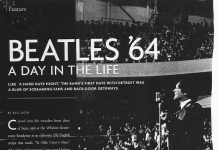
Sylvia Moy was born into a musically inclined family from Detroit’s Conant Gardens in 1938. Along with her eight brothers and sisters, she performed regularly in church choirs from the moment she could hold a tune. Moy’s sister Celeste Moy says their mother would later reminisce about teaching a young Moy the ABCs — a near-impossible feat, she says, until she tried teaching Moy the alphabet song. Now, 83 years later, Moy’s siblings are striving to build on the remarkable musical legacy that grew from those roots.
Moy was performing professionally by the time she reached her twenties, headlining local venues including the Caucus Club and London Chop House. One night in 1963, the now-legendary founder of Motown Records, Berry Gordy, happened to be in the audience. Impressed by Moy, he offered her a recording and songwriting contract with the label.
Despite her strong voice and exceptional range, Moy’s singing was not the talent that would lead to her success. She was soon diagnosed with stomach ulcers — an affliction that, at the time, was commonly attributed to stress — and doctors told Moy she must avoid nerve-racking activities such as performing. But with no shortage of vocal talent at Motown, Gordy was satisfied to keep her on as a songwriter alone. In fact, she became the label’s first female songwriter. But as such, Moy couldn’t follow the industry’s traditional path to success.
While her male coworkers were each assigned their own musicians to write for, she was not initially allowed to write independently. Instead, she was relegated to writing in partnership with Motown’s male songwriters — an arrangement that Celeste says meant Moy received only as much credit for her work as the men decided to allow her. But less than a year into her employment at Motown, Moy saw
an opportunity.
Gordy recounts an anecdote in his autobiography, To Be Loved, in which he assigns Moy direct responsibility for reversing Motown’s decision to drop an adolescent Stevie Wonder from the label. Wonder’s voice had begun to change due to puberty after he released “Fingertips” in 1963, and executives didn’t think there was room in the music scene for two blind, Black men — Ray Charles was already well established.
Moy thought this was a mistake. She approached Gordy with a proposition: She would write for Wonder, and if the song she penned was a hit, Motown would keep him on and assign her as his solo writer. Gordy accepted, and in 1965, Wonder released “Uptight,” which topped the Billboard R&B Singles chart for five weeks and earned Wonder his first two Grammy nominations.
Moy continued her work with Motown until 1973, after the studio relocated to California. While she followed the label for a while, Celeste says, “She just couldn’t adjust to California. She really was a Detroit girl.” So, with a number of hits — including Wonder’s “I Was Made to Love Her” and Martha and the Vandellas’ “Honey Chile” — now under her belt, Moy opted to launch her own recording studio in the city she loved. Following in Gordy’s footsteps, she opened Masterpiece Sound in the basement of her home at 1611 Webb.
She would go on to write and produce more than 100 additional songs at Masterpiece, for which she earned six Grammy nominations and 14 BMI Awards from performing rights organization Broadcast Music Incorporated. She was also inducted into the Songwriters Hall of Fame in 2006. At the ceremony, Stevie Wonder made a speech in which he told the story of how she’d saved his career.
But music wasn’t only an important part of Moy’s own life. She made consistent contributions to the musical enrichment of others. She did this on a small scale, by providing encouragement to children of her friends who expressed interest in music, and on a large scale. When cash-strapped Detroit schools began making cuts to arts programs, she founded and largely self-funded the Center for Creative Communications, which provides free music education to local children.Ěý
Moy lived in Detroit until her death from complications of pneumonia in 2017. At that time, her estate — including Masterpiece Sound and all of her artistic works — went to Celeste and their seven other siblings. They agreed to commit all these resources to the preservation of Moy’s legacy — an endeavor they began by remodeling the studio’s facilities and expanding its services. With renovations still in progress, the studio held a soft reopening in October. The fully revamped Masterpiece Sound Studios will have its complete launch sometime this year.
In honor of Moy’s dedication to music education, Masterpiece is also collaborating with Michigan State University. The partnership aims to help local musicians by holding music courses, taught by MSU professors, at the Detroit studio. Students of the program will receive MSU certificates of completion, providing the credentials they need to access high-quality industry jobs.
“We hope Masterpiece is a success in every way,” Celeste says, “something the city of Detroit can be proud of — as a tribute to our sister.”Ěý
Cue Up Some Sylvia MoyĚý

For a sense of Sylvia Moy’s songwriting prowess, cue up these R&B favorites, co-written with other influential Motown alums, such as Hank Cosby, Stevie Wonder, and Richard Morris.
1.“Uptight (Everything’s Alright),” Stevie Wonder
2. “This Old Heart of Mine (Is Weak for You),” The Isley Brothers
3.Ěý “It Takes Two,” Marvin Gaye & Kim Weston
4.Ěý “I Was Made to Love Her,” Stevie Wonder
5. “I’m Wondering,” Stevie Wonder
6. “Love Bug Leave My Heart Alone,” Martha & the Vandellas
7. “Honey Chile,” Martha & the Vandellas
8. â€ÂŮłó´Ç´Ç-µţ±đ-¶Ů´Ç´Ç-µţ±đ-¶Ů´Ç´Ç-¶Ů˛ą-¶Ů˛ą˛â,” Stevie Wonder
9. “My Cherie Amour,” Stevie Wonder
10. “(We’ve Got) Honey Love,” Martha & the Vandellas
11. “Never Had a DreamĚý Come True,” Stevie Wonder
12. “Forget Me Not,” Martha & the Vandellas
13. “With a Child’s Heart,” Michael Jackson
|
| Ěý |
|








